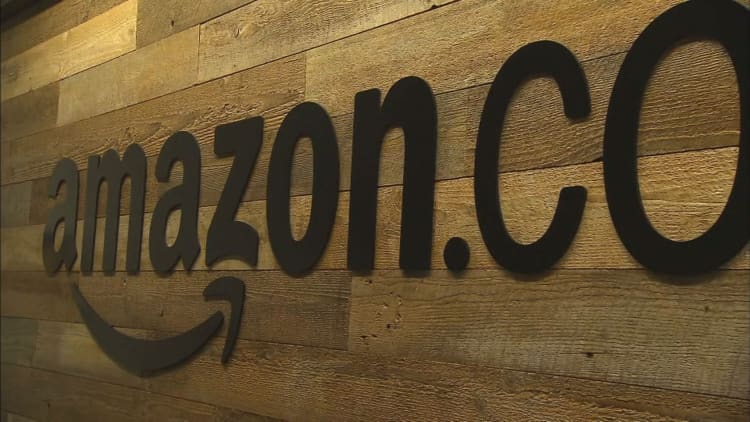
President Donald Trump reportedly wants to take on Amazon and the internet retail behemoth's tax treatment.
It is unclear what the president would, or could, do on his own, but actions in the two other branches of government could settle the issue for him.
The president has long argued that Amazon gets unfair tax treatment relative to brick-and-mortar retailers. Trump is "obsessed" with Amazon and wants to "go after" the company, Axios reported on Wednesday, citing sources. The company's stock, in turn, lost more than $50 billion in shareholder value at one point Wednesday.
Amazon shares flagged Thursday, too, after Trump tweeted more criticism about the online retailer. "Unlike others, they pay little or no taxes to state & local governments," the president wrote.
On Wednesday, White House press secretary Sarah Huckabee Sanders denied that the White House planned any imminent move against Amazon. "We have no announcement and no specific policies we are pushing for" related to Amazon, she said.
The president's reported stance on the company isn't new. In several tweets in recent years, Trump has argued for changes in how Amazon purchases get taxed. At issue is whether a state sales tax is levied on purchases made from a third-party Amazon vendor.
Last year, the online retailer started to collect sales taxes on products it sells directly to consumers in states that levy such taxes. But some retail competitors argue the policy for third-party vendors gives Amazon an unfair advantage.
What can the government do?
In February, Treasury Secretary Steven Mnuchin told the House's tax-writing committee that Trump "feels strongly" that the government should permit sales taxes on purchases made over the internet. Congress has the power to levy taxes, and it is unclear whether the Treasury can take any action itself against Amazon.
Even if the Trump administration takes no concrete actions itself, the agency and Trump himself could encourage Congress to pass legislation.
Some lawmakers have proposed legislation to settle the issue, but proposals have not gained traction in Congress. Rep. Kristi Noem, R-S.D., tried to attach a measure related to an internet sales tax to the $1.3 trillion spending bill that Trump signed into law last week.
The provision would allow states to collect sales taxes from the buyer based on the rate in the buyer's home state. Noem wanted to pass the bill before a U.S. Supreme Court ruling on the issue later this year, to give retailers more certainty.
Some conservatives have criticized proposals to uniformly levy state sales taxes because more costs could fall to consumers. While Noem said earlier this month that she opposes a tax increase, she said "out-of-state online retailers are aggressively exploiting a tax loophole, giving them a competitive advantage over local businesses."
"Only Congress can fix this problem in a thoughtful way that equips small business owners with the tools needed to comply with existing law, shields local job creators from egregious out-of-state audits, and levels the playing field," she said in a statement.
The measure did not make it into the spending bill and appears stalled in Congress. It is unclear whether Congress would take up the issue at Trump's urging.
The Senate Finance Committee declined to comment. A representative for the House Ways and Means Committee did not immediately respond to CNBC's requests to comment.
The Supreme Court considers the matter
The issue is likely to be settled in court before Congress has a chance to do something about it.
Earlier this year, the Supreme Court agreed to listen to arguments over internet sales taxes. The case sprang from a South Dakota law that would tax internet sales, as well as the state's lawsuit against online retailers such as Wayfair and Overstock.com.
The Supreme Court ruled in 1992 that states couldn't collect sales taxes gathered by mail-order catalog companies unless the firms had a physical presence in a state. South Dakota and several other states argue that things have changed in the era of Amazon.
The Supreme Court is expected to hear the arguments in April and could make a ruling by the end of June.
Earlier this month, the Trump administration, through Solicitor General Noel Francisco, formally backed up South Dakota in the case.
Citing online retailers' "pervasive and continuous virtual presence" in states, Francisco argued, "the states have ample authority to require those retailers to collect state taxes owed by their customers."
Trump's gripes with Amazon and its founder and CEO Jeff Bezos go beyond sales tax. He has "wondered aloud" about whether his administration could target Amazon with an antitrust law, a source told Axios.
The president has also repeatedly railed against the Bezos-owned Washington Post for news coverage he deems unfair. He has called the newspaper the "Amazon Washington Post," even though they are separate companies.
WATCH: Amazon is a much easier target for Trump than Facebook, says Josh Brown



